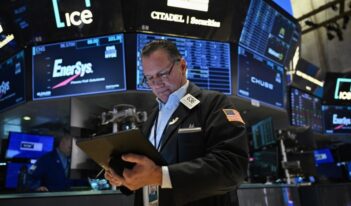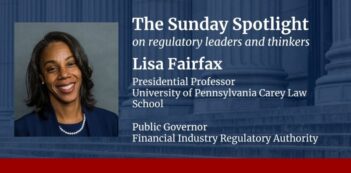
Scholar recommends implementing ESG standards to fight climate change and avoid criminal charges.
In 2021, Blackrock, one of the biggest investment firms in the world, set up an investment fund that purported to target environmental, social, and governance (ESG) objectives. Yet that fund had a higher concentration of fossil-fuel based stocks than even the S&P 500. How could this be?
BlackRock’s former chief investment officer, Tariq Fancy, claimed that behind his company’s potentially faulty ESG labeling was the simple truth that “there’s always money to be made from telling people what they want to hear,” and that in this case, investors wanted to hear “ESG,” regardless of the methodologies used to arrive at that label.
But according to J.S. Nelson, a visiting researcher in Harvard Law School’s Program on Negotiation, profit does not necessarily have to be sacrificed to establish an ESG fund that meets sustainability goals. Nelson argues that should the United States fail to adopt more predictable ESG investing standards, there could be dire consequences ranging from expanded liability for ESG fraud and misrepresentation to accelerated climate change.
According to Nelson, adopting ESG standards would more effectively deal with rapidly changing norms in finance and investing and provide U.S. businesses with baselines useful for financial and environmental disclosures.
To illustrate this point, Nelson draws attention to a study conducted by researchers at the Wharton School of the University of Pennsylvania, which used the example of automotive efficiency standards to show that U.S. businesses might actually favor implementing more predictable ESG standards. The study found that U.S. automakers preferred one nationwide fuel efficiency standard to varying state standards even if that meant that they had to adjust production to comply with a more stringent benchmark.
Why? Predictability.
The Wharton study found that automakers insisted that reliable, consistent, yet strict guidelines allowed them to plan for the future better than lenient, but unpredictable standards.
Multiplicative or ambiguous standards, however, resulted in higher costs and unnecessary complexity for manufacturers. Because manufacturers could not be sure that new technologies would comply with the unclear patchwork of standards, they effectively could not invest in new technologies.
Similarly, Nelson contends that were the United States to create climate change standards, businesses in the United States would benefit from brighter lines around climate-related disclosure.
Furthermore, U.S. businesses might be better protected from the increased litigation risk of corporate criminal and civil liability affiliated with such unclear ESG initiatives. These potential lawsuits might be brought by the U.S. Securities and Exchange Commission (SEC) or the U.S. Department of Justice, Nelson notes.
Nelson argues that the SEC’s approach to enforcement around ESG relies on “policing what companies say instead of what they do,” which supports increased prosecution for ESG fraud around disclosure. This fraud would likely be related to greenwashing, or exaggerating the level of “commitment to, or achievement of” particular climate targets, Nelson claims.
But what might these lawsuits look like?
According to Nelson, most prosecutions of U.S. corporations for fraudulent statements to investors related to ESG investing thus far have been civil, but a 2021 action against Deutsche Bank demonstrates that criminal liability might attach as well. Nelson points to the Deutsche Bank example as evidence that, although ESG may be an imprecise term, companies are nonetheless “making concrete promises” about ESG activities which may be verifiable, and thus prosecutable.
Nelson theorizes that, as money pours into the ESG investing sector, opportunities for fraud will abound. Indeed, Deutsche Bank’s failure to report potentially false labeling of an ESG investment fund constituted fraud. In this vein, Nelson points to “tough talk” now coming from the U.S. Justice Department. According to Nelson, the Justice Department under the Biden Administration intends to crack down on white collar crimes, and that could mean more prosecutions for fraud.
Nelson states that ESG fraud may start to look more attractive for prosecutors, especially when combined with the popularity and profitability of ESG investments, better available information about climate impact, and a general lack of corporate action to mitigate climate change.
Nelson points to two lawsuits against Exxon as evidence that fraud claims might ramp up in the near future. The first suit, which began in 2018, claimed that Exxon defrauded its investors by “misleading them about the risks to the company posed by climate change.” That suit may have failed, but the second suit might represent a step in the right direction, according to Nelson.
The second suit, involving a nearly identical set of facts as the first, is ongoing, but Nelson finds that the court’s acknowledgements of Exxon’s failure to disclose climate-related costs to investors aligns with the “sweeping statements about business liability for climate change” that have come out of foreign jurisdictions with ESG standards already in place.
Nelson claims that as the market for ESG investing becomes increasingly profitable, the demand for prosecution of U.S. corporations—such as Exxon—for fraudulent statements about ESG labeling grows.
According to Nelson, U.S. corporations can and do reap immense profits from ESG investing regardless of whether they follow disclosure standards. But, Nelson counters, these businesses would benefit even more from predictable standards around ESG because they could maintain these profits while avoiding expanded fraud liability and its accompanying costs. Nelson argues that, although tighter standards might reduce short-term profits, experience shows that they provide long-term benefits to corporations, funds, and humanity.



